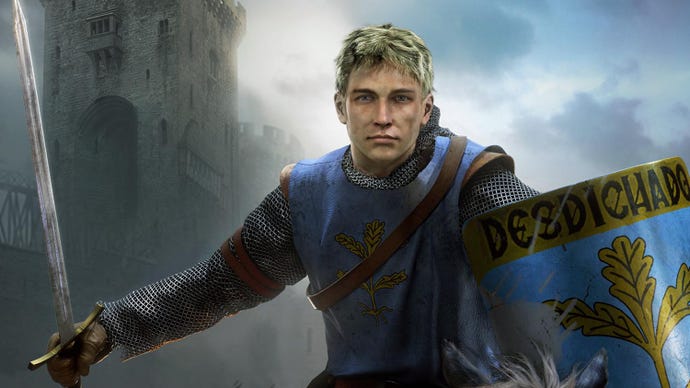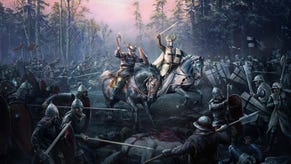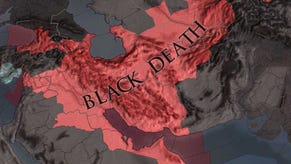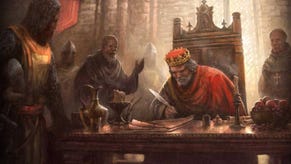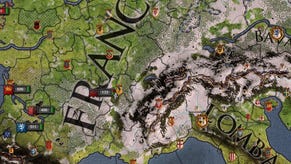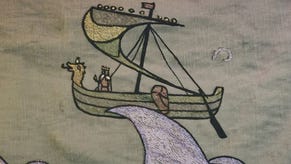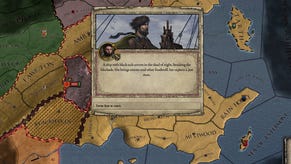End of a Reign: The Final Days of Crusader Kings 2
Paradox tells us about how it's giving Crusader Kings 2 a proper sendoff in the months leading up to Crusader Kings 3.
This article first appeared on USgamer, a partner publication of VG247. Some content, such as this article, has been migrated to VG247 for posterity after USgamer's closure - but it has not been edited or further vetted by the VG247 team.
Medieval people resembled many of us alive today in some interesting ways. Among other things, they always seemed to be convinced the world was ending. They didn't have a lot of hard data to confirm this like we do, but it seemed to be a pervasive mood nonetheless. Appropriately enough, given its setting, there have been questions and speculation for years about when crowns-and-castles strategy RPG Crusader Kings 2, which has received seven years of expansions and patches totalling hundreds of dollars of optional add-ons, would finally fade into the annals of history.
As we discussed in our chat about the history of Crusader Kings 2, the idea of supporting a game so long after release was unprecedented in the grand strategy genre and something of a great experiment for Paradox. Then-CEO and current Chairman of the Board Fredrik Wester admitted he "would have laughed" if asked what the game would look like in 2019, but as the expansions kept rolling, people kept buying them. The map expanded. The timeline expanded. Core roleplaying features were deepened with excellent additions like 2014's Way of Life and 2016's Conclave. In fan communities, the question arose: if we keep buying DLC, will they just keep it going forever?
It didn't seem that far-fetched. Paradox's EVP Creative Director Johan Andersson loves to chat about World of Warcraft any time we sit down—a game that is still getting expansions 15 years after release. The problem I was starting to notice even as far back as 2015's Horse Lords expansion (which sought to add nomadic steppe empires), though, was that Crusader Kings 2 seemed to be painted into a corner by its own core systems. It was running out of places to go.

I lamented at the time in a personal blog post that my favorite game had "lost track of what made it special," with marketing efforts focusing too much on pre-scripted content instead of on the systems and possibilities for emergent storytelling. This seemed to run counter to what Paradox's Chief Business Development Officer Shams Jorjani told me about the company's philosophy: "We don't want to tell stories. We want players to tell stories within our games."
And as it turned out, Crusader Kings 2's game director Henrik Fåhraeus agreed with me. Crusader Kings 3, secretly, had been in some stage of planning since 2014 and in active development since 2016. He admitted that some of the later expansions like Horse Lords were not as successful, trying to model societies that didn't really think about land ownership the way we do today within a design space meant to support warring feudal lords. The lackluster outcome and reception of such features lead to the decision to leave them out when moving forward with a new game.
"2017-ish, we probably knew that we would wind down [Crusader Kings 2]," he recalls. "Crusader Kings 3 was already in development, of course. So there were a lot of discussions about, how will CK2 impact CK3? What should our goals be there?"
The team foresaw two paths forward: they could let the aging monarch that was Crusader Kings 2 go quietly into that good night, leaving fans pining for more medieval madness and freeing up resources to work on the sequel. Or they could send it off with a bang, setting aside significant development time to create probably the largest and most full-featured expansion in the game's history. It's the latter path they ended up settling on.
"I guess the argument was that it's better to have a large and active player base of Crusader Kings players in general," Fåhraeus says.

Holy Fury, released around this time last year, was described as a "crowd-pleaser expansion" and a "love letter to the fans" by Crusader Kings 3's lead developer Alexander Oltner, who also worked on this final expansion. It focused on key areas like the Crusades, Catholic Europe, and pagan warrior lodges, and deepened the gameplay elements that were already the most popular instead of trying to add new ways to play entirely—a strategy that has been central to the development of the sequel as well. It added new settings to play in a politically fragmented or randomized world if you got tired of historical scenarios. Most importantly, it managed to make an old game feel new again.
At the time, we didn't know Holy Fury would be the last expansion for Crusader Kings 2. In fact, I was forced to eat my own words, admitting that it gave me faith there were still interesting places this game could go. Speculation on future expansions was reignited in fan communities. Would we finally get to play as chivalrous Holy Orders? Would Paradox be expanding gameplay for republics? Could we be getting new historical start dates? But even with the renewed vigor brought by Holy Fury, there were limitations of a foundation that had begun drying as far back as 2011 that the developers were eager to shake off.
"The code base of Crusader Kings 2 had gotten fairly spaghetti-like," Fåhraeus admits. It was cumbersome to work with, and didn't handle certain features it had long wanted to add like cadet houses. Lots of development time was being spent on optimization so it wouldn't run like molasses with all of the fancy additions. The fact was, Crusader Kings 2 had not been engineered from day one to last as long as it did or to expanded as much as it had. This, Fåhraeus cites, was one of the main motivations for moving on to Crusader Kings 3.
Even with no new expansions on the horizon, Paradox doesn't intend to let Crusader Kings 2 flounder in the months leading up to the release of the sequel. In an effort to give it a sendoff with appropriate fanfare to its stature, it released the free Iron Century update over the summer, adding a new starting date in the as-yet-untouched 900s with hundreds of new historical rulers and a host of story events for the storied Ottonian dynasty. More recently, it made the base game free for everyone, forever, and added a new way to play with the Monarch's Journey: a rotating challenge that tasks you with playing a specific historical ruler and accomplishing a tricky set of objectives with them. Participating in the Monarch's Journey will allow you to unlock some unique cosmetic items for Crusader Kings 3, like handing down an heirloom to your designated heir.
In that melancholic blog post I wrote before Holy Fury was announced in 2018, I described Paradox's recent efforts to keep Crusader Kings 2 alive as, "the spectacles of an aging king looking to recapture his glory days by putting on a tourney and swinging a mace around at a gaggle of young knights who have been discreetly instructed to let him win. It's a far cry from storming the walls of Acre in the crusades of his youth but, he hopes, the facsimile will be enough to fool at least himself for just a bit longer."
Little did I know at the time, there was already a strong, young heir waiting in the wings. Crusader Kings 2, it seems, will abdicate gracefully after all. To learn more about your new king, check out our preview in which Paradox answers 12 important questions about Crusader Kings 3.
